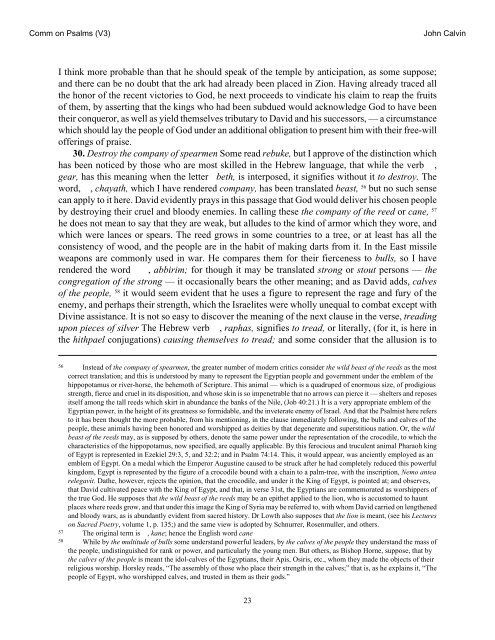Commentary on Psalms - Volume 3 - Bible Study Guides
Commentary on Psalms - Volume 3 - Bible Study Guides
Commentary on Psalms - Volume 3 - Bible Study Guides
- No tags were found...
You also want an ePaper? Increase the reach of your titles
YUMPU automatically turns print PDFs into web optimized ePapers that Google loves.
Comm <strong>on</strong> <strong>Psalms</strong> (V3)John CalvinI think more probable than that he should speak of the temple by anticipati<strong>on</strong>, as some suppose;and there can be no doubt that the ark had already been placed in Zi<strong>on</strong>. Having already traced allthe h<strong>on</strong>or of the recent victories to God, he next proceeds to vindicate his claim to reap the fruitsof them, by asserting that the kings who had been subdued would acknowledge God to have beentheir c<strong>on</strong>queror, as well as yield themselves tributary to David and his successors, — a circumstancewhich should lay the people of God under an additi<strong>on</strong>al obligati<strong>on</strong> to present him with their free-willofferings of praise.30. Destroy the company of spearmen Some read rebuke, but I approve of the distincti<strong>on</strong> whichhas been noticed by those who are most skilled in the Hebrew language, that while the verb ,gear, has this meaning when the letter beth, is interposed, it signifies without it to destroy. Theword, , chayath, which I have rendered company, has been translated beast, 56 but no such sensecan apply to it here. David evidently prays in this passage that God would deliver his chosen peopleby destroying their cruel and bloody enemies. In calling these the company of the reed or cane, 57he does not mean to say that they are weak, but alludes to the kind of armor which they wore, andwhich were lances or spears. The reed grows in some countries to a tree, or at least has all thec<strong>on</strong>sistency of wood, and the people are in the habit of making darts from it. In the East missileweap<strong>on</strong>s are comm<strong>on</strong>ly used in war. He compares them for their fierceness to bulls, so I haverendered the word , abbirim; for though it may be translated str<strong>on</strong>g or stout pers<strong>on</strong>s — thec<strong>on</strong>gregati<strong>on</strong> of the str<strong>on</strong>g — it occasi<strong>on</strong>ally bears the other meaning; and as David adds, calvesof the people, 58 it would seem evident that he uses a figure to represent the rage and fury of theenemy, and perhaps their strength, which the Israelites were wholly unequal to combat except withDivine assistance. It is not so easy to discover the meaning of the next clause in the verse, treadingup<strong>on</strong> pieces of silver The Hebrew verb , raphas, signifies to tread, or literally, (for it, is here inthe hithpael c<strong>on</strong>jugati<strong>on</strong>s) causing themselves to tread; and some c<strong>on</strong>sider that the allusi<strong>on</strong> is to56 Instead of the company of spearmen, the greater number of modern critics c<strong>on</strong>sider the wild beast of the reeds as the mostcorrect translati<strong>on</strong>; and this is understood by many to represent the Egyptian people and government under the emblem of thehippopotamus or river-horse, the behemoth of Scripture. This animal — which is a quadruped of enormous size, of prodigiousstrength, fierce and cruel in its dispositi<strong>on</strong>, and whose skin is so impenetrable that no arrows can pierce it — shelters and reposesitself am<strong>on</strong>g the tall reeds which skirt in abundance the banks of the Nile, (Job 40:21.) It is a very appropriate emblem of theEgyptian power, in the height of its greatness so formidable, and the inveterate enemy of Israel. And that the Psalmist here refersto it has been thought the more probable, from his menti<strong>on</strong>ing, in the clause immediately following, the bulls and calves of thepeople, these animals having been h<strong>on</strong>ored and worshipped as deities by that degenerate and superstitious nati<strong>on</strong>. Or, the wildbeast of the reeds may, as is supposed by others, denote the same power under the representati<strong>on</strong> of the crocodile, to which thecharacteristics of the hippopotamus, now specified, are equally applicable. By this ferocious and truculent animal Pharaoh kingof Egypt is represented in Ezekiel 29:3, 5, and 32:2; and in Psalm 74:14. This, it would appear, was anciently employed as anemblem of Egypt. On a medal which the Emperor Augustine caused to be struck after he had completely reduced this powerfulkingdom, Egypt is represented by the figure of a crocodile bound with a chain to a palm-tree, with the inscripti<strong>on</strong>, Nemo antearelegavit. Dathe, however, rejects the opini<strong>on</strong>, that the crocodile, and under it the King of Egypt, is pointed at; and observes,that David cultivated peace with the King of Egypt, and that, in verse 31st, the Egyptians are commemorated as worshippers ofthe true God. He supposes that the wild beast of the reeds may be an epithet applied to the li<strong>on</strong>, who is accustomed to hauntplaces where reeds grow, and that under this image the King of Syria may be referred to, with whom David carried <strong>on</strong> lengthenedand bloody wars, as is abundantly evident from sacred history. Dr Lowth also supposes that the li<strong>on</strong> is meant, (see his Lectures<strong>on</strong> Sacred Poetry, volume 1, p. 135;) and the same view is adopted by Schnurrer, Rosenmuller, and others.57 The original term is , kane; hence the English word cane58 While by the multitude of bulls some understand powerful leaders, by the calves of the people they understand the mass ofthe people, undistinguished for rank or power, and particularly the young men. But others, as Bishop Horne, suppose, that bythe calves of the people is meant the idol-calves of the Egyptians, their Apis, Osiris, etc., whom they made the objects of theirreligious worship. Horsley reads, “The assembly of those who place their strength in the calves;” that is, as he explains it, “Thepeople of Egypt, who worshipped calves, and trusted in them as their gods.”23
















